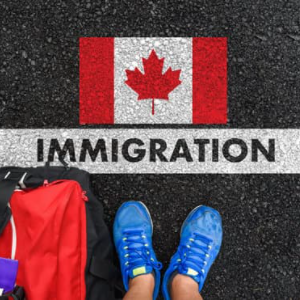Getting started in Canada

Starting a new life in Canada can be a rewarding and exciting task with proper preparation. To immigrate permanently, explore options such as the Skilled Worker Program (Federal), the Skilled Trades Worker Program (Federal), the Provincial Nominee Program, or the Business Start-Up Program. Before you leave, prepare your documents, find your future home, and start learning English or French. When you arrive, obtain your official documents, find accommodation, look for a job, and enroll your children in school. Integrate yourself into the local community, understand the Canadian healthcare system and adapt to the climate. Managing your time and stress effectively will also contribute to a smooth transition to your new life in Canada.
Thinking of starting a new life in Canada? This North American country attracts many immigrants every year with its high standard of living, natural wealth, cultural diversity and economic opportunities. In this article, we'll guide you through every step of the way to settling in Canada smoothly and efficiently.
Immigration options for settling permanently in Canada
There are several ways to immigrate to Canada permanently. Here are the details:
- Skilled Worker Program (Federal) This program is designed for people with some work experience, a high level of education and fluency in English or French.
- Specialized Trades Worker Program (Federal) This program is designed to attract workers to specific trades that are in demand in Canada.
- Provincial Nominee Program It allows provinces and territories to nominate individuals who wish to immigrate to Canada and who are interested in living in a specific province.
- Business Start-up, Investor, Entrepreneur and Self-Employed Visa Program These programs are designed for individuals with entrepreneurial experience, who are ready to invest in Canada or start a business in Canada.
Things to do before arriving in Canada
Before arriving in Canada, you must :
- Prepare your documents Make sure you have all your official documents such as passports, birth certificates, diplomas, etc. in order and accessible.
- Research where you're going to live Find out about the cost of living, climate, schools, health services, etc.
- Learning official languages Canada has two official languages, English and French. Proficiency in either of these languages can help you integrate more easily.
Things to do immediately after arriving in Canada
As soon as you arrive in Canada, here are some important things to do:
- Obtain official documents These include your confirmation of permanent residence, permanent resident card, social insurance number, provincial health card and driver's licence.
- Finding accommodation Whether renting an apartment or buying a house, finding a place to live is crucial. Real estate websites and local agencies can be invaluable resources.
- Find a job The Canadian government offers job search assistance for newcomers. Online recruitment platforms are also useful.
- Registering children for school and daycare : The Canadian education system is of high quality and compulsory up to the age of 16 or 18, depending on the province.
Learning official languages
Canada is a bilingual country, with English and French as its official languages. Mastering these languages can help you not only to integrate into the community, but also to find a job more easily. There are many free online resources and community courses to help you learn.
Getting a driver's license
Canadian driver's licenses are issued by the provinces and territories. Check the regulations of your destination province to find out if you can use an international license, or if you need to take a driving test. The driver's license is also a commonly accepted form of identification.
Shopping
In Canada, you'll find many supermarkets, grocery stores and farmers' markets where you can do your shopping. Some supermarkets offer home delivery services, which can be handy when you're first settling in. Don't forget to take a reusable bag with you, as most stores either charge for plastic bags or don't offer them.
Time management
The pace of life in Canada can vary according to region and individual lifestyle. Canadians place great importance on work-life balance. It's important to manage your time so that you can accomplish your daily tasks, while allowing yourself time for leisure and rest.
Stress management
Moving to a new country can be stressful. To manage the stress, try to create a daily routine, connect with the local community, and don't hesitate to ask for help if necessary. Canadians are known for their friendliness and willingness to help.
In conclusion, starting a new life in Canada can seem a daunting task, but with the right preparation and an open-minded attitude, you can settle and integrate successfully in this beautiful country. Welcome to Canada!
Integration into the local community
Moving to Canada also means integrating into your local community. Canadians are generally very welcoming and open to cultural exchange, which can make your integration much easier.
Participate in local events is a great way to meet people and understand the local culture. This can include festivals, sporting events or farmers' markets.
The volunteering is another way to get in touch with the local community. Not only does it allow you to give back, but it can also help you develop new skills and make connections.
Make an effort to meet your neighbors. A simple introduction can pave the way for friendly relations and mutual support.
Understanding the Canadian healthcare system
Canada has a universal health care system, which means that most health care services are free for residents. However, there are a few things you should know.
As a newcomer, you must apply for a provincial health card. Each province has a different system, so be sure to check your province's specific requirements.
Most essential medical services are covered by the health plan. This includes doctor's visits and most hospital treatments. However, some services, such as dental and optometric care, are not always covered. You may want to consider a private health insurance for these services.
Adapting to the Canadian climate
Canada has a very diverse climate, with hot summers and cold winters in many regions.
For winterIn any case, it's crucial to have the right clothing to keep you warm. This includes coats, hats, gloves and water-resistant boots. If you drive, it's important to understand the rules of winter driving, as snow and ice can make roads dangerous.
During the summerSun protection is essential. Make sure you have adequate sunscreen, sunglasses and sun-protective clothing. It's also important to stay hydrated, especially in hot weather.
By understanding the climate and preparing accordingly, you can take full advantage of all the seasons in Canada.






